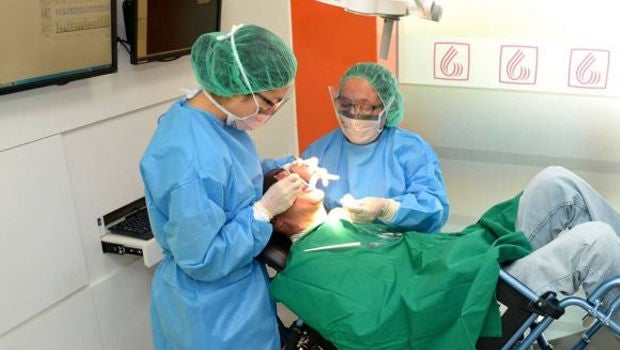
In a picture taken in June 2016, a patient receives dental treatment at the Geriatric Special Care Dentistry Clinic (GSDC) at National Dental Centre Singapore (NDCS).PHOTO: ST FILE
The number of dental patients here who need specialised care - such as those with special needs or mobility issues - is rising, reflecting a need for more specialists to be trained in this area.
At the National Dental Centre Singapore's (NDCS) Geriatric Special Care Dentistry Clinic, the yearly patient attendance or number of patient visits has been increasing, from 4,000 in 2016 to 7,500 in 2017 and nearly 8,000 last year.
Its patients include those with special needs such as intellectual disabilities, those who have physical and functional limitations due to conditions such as dementia and muscular dystrophy, and those who require closer dental monitoring after receiving head and neck radiation therapy.
"In terms of our healthcare priorities, dental care tends to be a lower priority, especially among patients with multiple medical problems," said Dr Yang Jingrong, who heads the clinic.
She added: "Sometimes, it's not just the mouth that is difficult to treat but the whole social context. For example, are you being taken care of by a domestic helper or a family member, and how well is this person equipped to deal with your needs?"
The NDCS predicts that the demand for special care dentistry at its clinic will exceed supply by 2025, when there will be an estimated 164,000 patients - comprising the functionally dependent elderly and special needs patients in Singapore.
The number of patients is expected to reach 19,000 in 2025, outstripping the clinic's current capacity of 12,000 visits a year.
This figure is based on the NDCS handling about 10 per cent of the estimated 164,000 cases in 2025, as well as around 2,600 patients who need dental clearance before medical treatment for conditions such as heart surgery or radiotherapy.
The clinic currently has seven special care dentists, but in 2025, a total of 19 such dentists will be needed.
As there is no local master's programme in special care dentistry, dentists have to enrol in courses overseas, such as in Australia and New Zealand.
The pressing need for more special care dentists is also a problem in the United Kingdom, where it was only in 2008 that the field became a speciality, said Dr Carole Boyle, a consultant in special care dentistry at Guy's and St Thomas' Hospitals.
"The challenge is expanding the speciality. We have far fewer trainees in special care dentistry than in other specialities like orthodontics," she added.
"Our patients who have special needs are often from lower socio-economic classes and have difficulty accessing care, and the UK's National Health Service is going through a bit of a funding crisis."
Dr David Craig, head of sedation and special care dentistry at Guy's and St Thomas' Hospitals, said that special care dentistry in the UK was a sporadic service about 30 years ago.
But in recent years, he said, dentists in this field have received better training and more recognition, raising the standard of care.
The British experts were in Singapore last Wednesday to visit the Geriatric Special Care Dentistry Clinic and conduct a lecture.
Dr Boyle said that patients who need special care dentistry often require more time during treatment, be it due to communication or mobility issues.
To manage patients' anxiety, Guy's and St Thomas' Hospitals use methods such as cognitive behavioural therapy, local anaesthetic and conscious sedation.
"What we want trainees to do when they graduate is treat patients in their own practice. So somebody with Down syndrome can go to a family dentist and receive treatment with the rest of their family, and not be left at home or have to go to a special clinic," said Dr Boyle.













 Get it on Google Play
Get it on Google Play